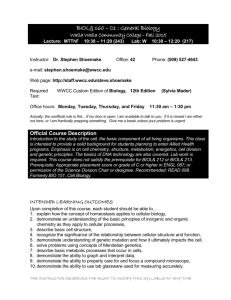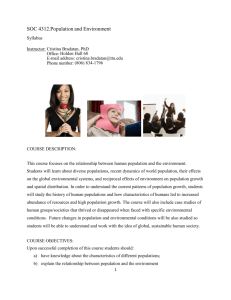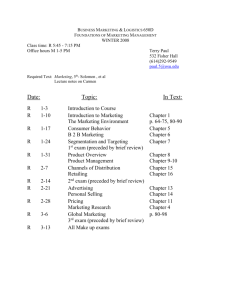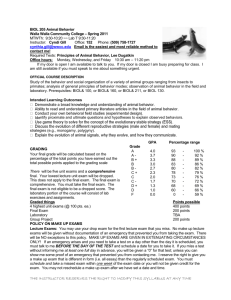BSL 110: Human Anatomy & Physiology I
advertisement
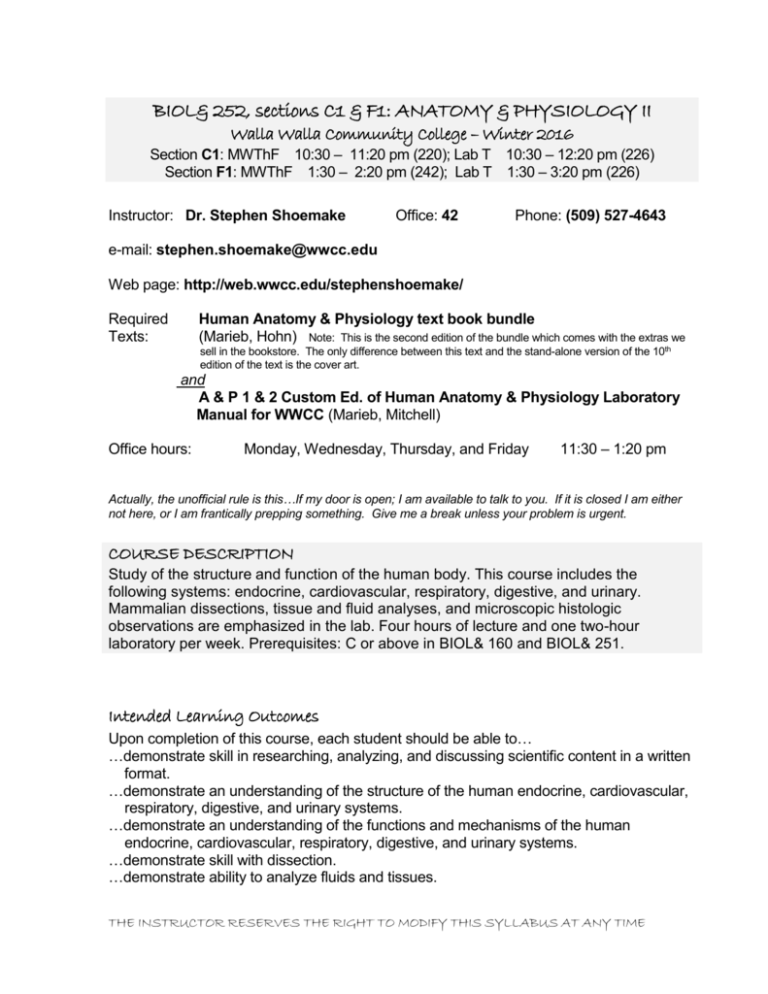
BIOL& 252, sections C1 & F1: ANATOMY & PHYSIOLOGY II Walla Walla Community College – Winter 2016 Section C1: MWThF 10:30 – 11:20 pm (220); Lab T 10:30 – 12:20 pm (226) Section F1: MWThF 1:30 – 2:20 pm (242); Lab T 1:30 – 3:20 pm (226) Instructor: Dr. Stephen Shoemake Office: 42 Phone: (509) 527-4643 e-mail: stephen.shoemake@wwcc.edu Web page: http://web.wwcc.edu/stephenshoemake/ Required Texts: Human Anatomy & Physiology text book bundle (Marieb, Hohn) Note: This is the second edition of the bundle which comes with the extras we sell in the bookstore. The only difference between this text and the stand-alone version of the 10th edition of the text is the cover art. and A & P 1 & 2 Custom Ed. of Human Anatomy & Physiology Laboratory Manual for WWCC (Marieb, Mitchell) Office hours: Monday, Wednesday, Thursday, and Friday 11:30 – 1:20 pm Actually, the unofficial rule is this…If my door is open; I am available to talk to you. If it is closed I am either not here, or I am frantically prepping something. Give me a break unless your problem is urgent. COURSE DESCRIPTION Study of the structure and function of the human body. This course includes the following systems: endocrine, cardiovascular, respiratory, digestive, and urinary. Mammalian dissections, tissue and fluid analyses, and microscopic histologic observations are emphasized in the lab. Four hours of lecture and one two-hour laboratory per week. Prerequisites: C or above in BIOL& 160 and BIOL& 251. Intended Learning Outcomes Upon completion of this course, each student should be able to… …demonstrate skill in researching, analyzing, and discussing scientific content in a written format. …demonstrate an understanding of the structure of the human endocrine, cardiovascular, respiratory, digestive, and urinary systems. …demonstrate an understanding of the functions and mechanisms of the human endocrine, cardiovascular, respiratory, digestive, and urinary systems. …demonstrate skill with dissection. …demonstrate ability to analyze fluids and tissues. THE INSTRUCTOR RESERVES THE RIGHT TO MODIFY THIS SYLLABUS AT ANY TIME LECTURE AND LABORATORY CONTENT Major topics discussed in the course description may be presented and reinforced through lectures, group work, videos, or individual assignments. The sequence of topics may not exactly follow the sequence they are presented in the text book, and you may have to read all or part of several different chapters in the course of working on one major topic. Although the lecture and the laboratory deal with different aspects of the major topics, the material investigated in the laboratory is meant to support and clarify lecture topics. For this reason, the lecture exams will contain material from both the lecture and the laboratory. The laboratory quizzes will not normally contain material dealt with exclusively in the lecture. The text book for this course is important. Rely on it heavily as a valuable resource for learning this material. GRADING Your final grade will be calculated based on the percentage of the total points you have earned out the total possible points applied to the grading scale below: Grade A AB+ B BC+ C CD+ D F GPA 4.0 3.7 3.3 3.0 2.7 2.3 2.0 1.7 1.3 1.0 0.0 Percentage range 93 100 % 90 92 % 87 89 % 83 86 % 80 82 % 77 79 % 73 76 % 70 72 % 67 69 % 60 66 % 0 59 % Percentages will be rounded to the nearest percentage point for assignment of grades. There will be three unit exams and a comprehensive final. Two of the unit exams and the final will be worth 100 points. Your lowest unit exam score will count for only 50 points. (That way a poor exam score doesn’t hurt you as much.) THIS DOES NOT APPLY TO THE FINAL EXAM! You must take the score you earn on the final regardless of whether it is the lowest score or not. The laboratory portion of the course is worth 100 total points, and will consist of quizzes and assignments given in the laboratory on laboratory topics. The total points possible for laboratory may vary; so your total laboratory score will be calculated by multiplying your total laboratory percentage by 100. In other words, the total laboratory score is equivalent to one exam. A grade breakdown follows: THE INSTRUCTOR RESERVES THE RIGHT TO MODIFY THIS SYLLABUS AT ANY TIME Graded things Points possible 2 highest unit exams (2 @ 100 pts. ea.) .... 200 points Lowest unit exam......................................... 50 points Final Exam.................................................... 100 points Laboratory (quizzes & assignments)........... 100 points Group Work & Lecture Assignments Variable Barring extenuating circumstances, you are assured a grade no worse than that indicated by your total percentage. That is, if you earn 93% of the points, you will get an A. I reserve the right, however, to lower the scale if I deem it necessary. POLICY ON MAKE UP EXAMS MAKE UP EXAMS ARE GIVEN IN EXTENUATING CIRCUMSTANCES ONLY! If an emergency arises and you need to take a test on a day other than the day it is scheduled, you must talk to me BEFORE THE DAY OF THE TEST and schedule a date for you to take it. If you miss a test without informing me at least one full day in advance, you will be given a “0” for that test; unless you can show me some proof of an emergency that prevented you from contacting me. I reserve the right to give you a make up exam that is different in form (i.e. all essay) than the regularly scheduled exam. You must schedule and take a missed exam within one week of the exam date or you will not be given credit for the exam. ATTENDANCE I expect you to attend every lecture and laboratory session for the full amount of time that it is scheduled. (Do not schedule doctor’s appointments or anything else during scheduled class time!) Since you are adults, I will not dock you points for missing a class. You will, however, be held responsible for all of the material covered in the course regardless of whether or not you were in attendance when it was presented. Additionally, you will be held to the due date for an assignment even if you were not in class when it was assigned. If you ever have to miss a class, ask one of your fellow students to pick up an extra copy of any handouts and assignments for you. Make sure that you get the notes they took in class, too. I will try to post most assignments on my Web site so you can download and print them out (no guarantees). If all else fails, come and see me to get any assignments you may have missed. Under no circumstances will I allow students to copy my lecture notes after they have missed a class. REMEMBER - NOT KNOWING THAT I ASSIGNED SOMETHING IS NOT A VALID EXCUSE FOR IT BEING LATE. LATE WORK POLICY Late assignments will be penalized 20% of the total possible points for the assignment. Assignments turned in more than 2 class days after the designated due date WILL NOT BE ACCEPTED FOR CREDIT. (Example: If an assignment is due on a Monday, you have until Wednesday to turn it in for credit. If you turn it in after that, you will be given a “0” for the assignment. THE INSTRUCTOR RESERVES THE RIGHT TO MODIFY THIS SYLLABUS AT ANY TIME GROUP WORK POLICY The intention of group work is to promote learning in a manner that is not available to you outside of class. It is often of great value to talk to your fellow students about difficult concepts, or to work with them to solve complex problems. For this reason, you CAN NOT EARN POINTS FOR GROUP WORK IF YOU WERE NOT IN CLASS TO PARTICIPATE IN THE ACTIVITY. If you miss a class session in which group work is collected for grading, you will be given a “0” for that activity. These points can not be made up. WITHDRAWAL The last day that you can drop this course is Feb 18th. To drop a course, you must complete the proper forms at the Admissions Office. It is your responsibility to initiate a drop. Failure to officially drop a class or withdraw from school in a timely manner may disqualify you from receiving a refund of tuition and fees and cause you to receive a failing grade. ACADEMIC DISHONESTY Cheating and/or plagiarism will not be tolerated. The following excerpt is from the “Student Code of Conduct” policy which can be found on the Web through the following route: wwcc.edu current students Student Policies Student Code of Conduct. (Direct URL: http://www.wwcc.edu/CMS/index.php?id=426.) PLAGIARISM/CHEATING 1. Plagiarism is defined as the buying, borrowing, or stealing of written material for the purpose of fulfilling or partially fulfilling any assignment or task required as part of the student’s program of instruction at the College. Any student who plagiarizes shall be subject to disciplinary action. 2. Any student who aids or abets the accomplishment of such activity as defined in subsection (1) above shall also be subject to disciplinary action. 3. An instructor may take reasonable action against any student who is deemed to have been guilty of plagiarism or cheating. Course of action might include but not be limited to: a. student receive warning and lowered grade; b. student receive failing grade for the course; c. student dropped from course; d. student be recommended for suspension or dismissal from the College; e. case referred to civil action. An instructor taking action against any student for an act of academic misconduct shall report such action to the Vice President of Instruction and the Vice President of Student Services, as soon as possible, but no later than five working days after the incident. Any student subject to action of an instructor for a violation of this section may seek review of that action by the Vice President of Student Services, if such request is submitted in writing within five working days from the date of the complained-of action. THE INSTRUCTOR RESERVES THE RIGHT TO MODIFY THIS SYLLABUS AT ANY TIME EXAM CHALLENGE PROCEDURE You may resubmit each unit exam for re-grade if corrections are needed due to grading errors. If you feel you have been graded unfairly, you may challenge individual test questions. The procedures for doing so are written below. Challenges are due one week after the exam in question is handed back. Challenges turned in after that will not be considered. I WILL NOT VERBALLY ARGUE POINTS WITH YOU UNLESS YOU BRING IN A WRITTEN CHALLENGE FIRST. 1. Check the correct answer. Make sure you are convinced that the answer you selected is better than the one the key says is correct. 2. Write out a challenge. In this challenge, you should indicate why you think you should be given credit for something that I counted wrong or did not give you points for. Be precise, and back up your assertions with references from the text book or some other valid source. I'm pretty confident that the answers I selected are the correct ones. If you want me to give you credit for your answer, you need to convince me that it is a better answer than the one I put (or at least that it is equally as good an answer). THINGS THAT IRK ME I think it is only fair that I let you know some of the things that upset me, so that you can avoid doing them. If you really want to make me mad, you should… 1. 2. 3. 4. 5. 6. 7. let your cell phone ring in class. read or send a text message while in class. carry on a conversation while I am trying to lecture. show up for class late. gather up your books and shuffle around before I am done talking. ask me, “Do we have to know this?” whine a lot about having too much information on a test. WHAT I EXPECT FROM YOU As a student in my class, I expect that you will… 1. show due respect to your fellow students and to me. 2. frequently review course material. 3. do all of the reading in the text and lab manual which supports what we discuss in lecture and lab. 4. Keep track of your progress. In other words, if you are doing poorly, you should realize it early and come to see me before it is too late. 5. Enjoy yourself. The human body is a fascinating thing. If you keep this in mind, the work that this course requires is much more tolerable. THE INSTRUCTOR RESERVES THE RIGHT TO MODIFY THIS SYLLABUS AT ANY TIME TENTATIVE SCHEDULE OF LECTURE TOPICS / EXAMS I have not attached exact dates to the topics below so we are free to adjust the amount of time we spend on each. The test dates are firm, and will include all topics covered in lecture and laboratory up to the exam. The text book for this course is excellent, and you should rely heavily on it for studying. I will not usually test you on subjects I have not presented in class, but time limits the amount of detail I can present. I will expect you to fill in the gaps with your reading. THE MOST RELIABLE THING YOU CAN DO TO ENSURE YOUR SUCCESS IS TO DO ALL OF YOUR READING. Topic Introduction / Syllabus review / Cell Bio & A & P I Review Text Chapter(s) review Endocrine System 16 Urinary System 25, 26 Cardiovascular System 17, 18, 19, 26 Respiratory System 22 Digestive System 23 Exam Schedule Lecture Exams 1 2 3 Monday, Jan. 25th Wednesday, Feb. 17th Friday, Mar. 11th Lab Exams 1 2 3 Tuesday, Feb. 2nd Tuesday, Feb. 23rd Tuesday, Mar. 8th Final Exams Thursday, Mar. 17th THE INSTRUCTOR RESERVES THE RIGHT TO MODIFY THIS SYLLABUS AT ANY TIME TENTATIVE SCHEDULE OF LABORATORY TOPICS / EXAMS Date Topic / Activity Jan. 5th Intro. to the Endocrine System (lecture) Jan. 12th Endocrine System gross/microscopic structure (Fetal Pig dissection) Jan. 19th Urinary System Gross Anatomy (Kidney dissection) Jan. 26th Urinalysis Feb. 2nd LAB EXAM (Includes all material from Endocrine and Urinary Laboratories.) Feb. 9th Cardiovascular System (Blood) Feb. 16th Cardiovascular System: Heart & peripheral circulation (Heart dissection) Bring completed pre-lab activity Feb. 23rd Mar. 1st Mar. 8th Mar. 15th LAB EXAM (Includes all material from blood lab—including survey of leukocytes—heart anatomy, and coronary circulation) Respiratory / Digestive System Laboratory LAB EXAM (Includes respiratory anatomy, volumes & capacities, & Systemic circulation (i.e. body veins & arteries). Lab will not meet. We will take Lecture Exam #3 in the normal lecture classroom. Note for students regarding disabilities: If you have a disability for which you may be requesting an accommodation, contact Claudia Angus, Ph.D., Coordinator of Disability Support Services (phone: 527-4262 or email: claudia.angus@wwcc.edu ) as early as possible in the quarter. I can not give you accommodations until you do so. THE INSTRUCTOR RESERVES THE RIGHT TO MODIFY THIS SYLLABUS AT ANY TIME
